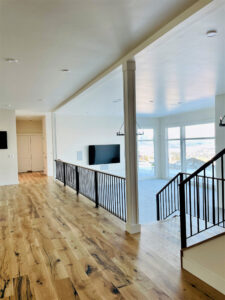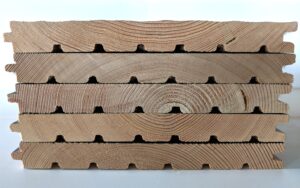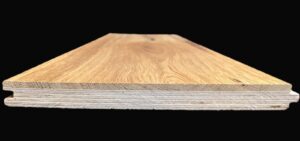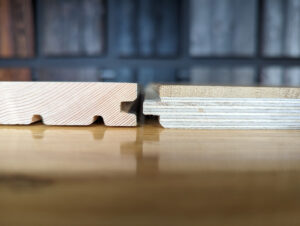Can you install hardwood flooring in a basement?
Posted: April 28, 2025Author – Ryan Palma Owner/CEO Sustainable Lumber Co.
Click on these links to view our extensive line of sustainable hardwood flooring, or to contact us for a pricing quote.

Is Hardwood Flooring in a Basement a Good Idea?
When people ask, “Can you put hardwood in a basement?” the answer depends on the conditions of the space. Basements are prone to moisture and temperature changes, which can affect how well hardwood performs. However, with proper preparation and product selection, hardwood flooring in basement environments can be both beautiful and long-lasting.
Solid Hardwood: What You Should Know
Solid hardwood is the real deal, 100% natural wood, full of character. However, it is more susceptible to moisture and temperature swings, which basements are famous for. If your basement is below grade (partly or fully underground), humidity can creep up and make solid hardwood expand, shrink, or even warp over time.

Why Engineered Hardwood Flooring for Basement Projects Works Best

Prior to installation, it is critical to assess the moisture content of the concrete. A calcium chloride test is recommended, with most manufacturers specifying a moisture level below 4% as acceptable. Neglecting this precaution may result in issues such as warping, buckling, or mold. If you’re considering installing hardwood flooring in a basement, engineered hardwood is widely regarded as the most reliable choice.
Key Tips for Successful Basement Hardwood Floor Installation

No damp slabs allowed – If your basement’s concrete is wet or unsealed, you must get the moisture content under 4%
Acclimatize the wood – Let your flooring sit in the basement for 7-10 days before installation so it adjusts to the environment.
Watch for water – If your basement is susceptible to water damage, hardwood probably isn’t the right choice, you may want to consider luxury vinyl plank instead. It mimics wood but is generally water resistant.
So, Should You Do It?
Absolutely, if your basement’s ready for it! Engineered hardwood is the safer bet for most basements, but solid hardwood can work with extra TLC. Check your space, how’s the humidity? Any leaks? Either way, with the right prep, you’ll be enjoying your gorgeous wood floors in no time. If you’re still unsure, our team can help guide you through the best engineered hardwood flooring options for basements.
Contact us:
Our knowledgeable and educated staff is here to answer any additional questions you may have. Please call us today for a free quote: Ph# 406.642.7120 or click here to submit an inquiry online. We look forward to working with you on your next project!

